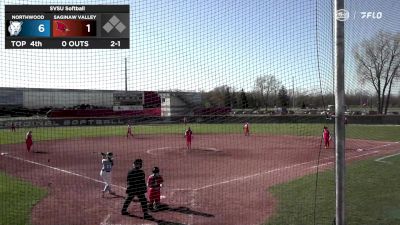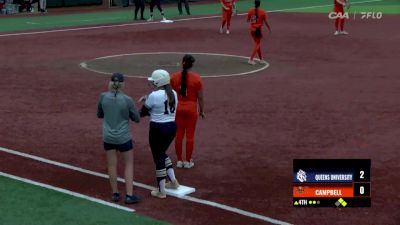University of North Dakota Could Be Losing Softball
University of North Dakota Could Be Losing Softball
University of North Dakota softball is one of eight sports at the university that may be cut. Men's and women's tennis, men's and women's swimming and diving, men's and women's golf, and women's soccer could be facing elimination.

University of North Dakota softball is one of eight sports at the university that may be cut. Men's and women's tennis, men's and women's swimming and diving, men's and women's golf, and women's soccer could be facing elimination according to Grand Forks Herald.
In front of a 18-member committee, each sport made their 30 minute plea in front of the university's Intercollegiate Athletic Committee and UND President Mark Kennedy.
One by one coaches and players delivered emotional speeches hoping to save their programs.
In Coach Jordan Stevens speech he said, "I wanted to know why this was done and for what reason. The only answer I was told was that we want champions."
The softball program and made visible strides but what's alarming is that baseball and men's golf were cut in April because of a state-mandated and university-wide budget cut. Fortunate for men's golf, they have raised funds to keep golf going for the next two seasons.
In 2014, Robert Morris dropped seven sports and Temple soon followed. Professor of Sport Management at Drexel University comments, "The ability to be able to provide a large and expansive athletic department is becoming a thing of the past."
By Robert Morris cutting down from 23 teams to 16 teams, the university saved $1-1.2 million annually. Former Robert Morris President Gregory Dell'Omo told Pittsburgh Post-Gazette, "Down the road, in the next couple of years, as more institutions are having more and more financial challenges, you're going to see this become much, much more of a reactionary approach. That's not a positive trend for collegiate athletics."
"Sometimes, smaller schools may not have adjusted their programs to a reality of what the realistic revenue generation is versus realistic expenditures," said Richard Southall, the director of the College Sport Institute at the University of South Carolina. "It's no different than any college or university that has to deal and live within a budget. You have to be realistic about what the purpose of athletics is in college."
In front of a 18-member committee, each sport made their 30 minute plea in front of the university's Intercollegiate Athletic Committee and UND President Mark Kennedy.
One by one coaches and players delivered emotional speeches hoping to save their programs.
In Coach Jordan Stevens speech he said, "I wanted to know why this was done and for what reason. The only answer I was told was that we want champions."
The softball program and made visible strides but what's alarming is that baseball and men's golf were cut in April because of a state-mandated and university-wide budget cut. Fortunate for men's golf, they have raised funds to keep golf going for the next two seasons.
In 2014, Robert Morris dropped seven sports and Temple soon followed. Professor of Sport Management at Drexel University comments, "The ability to be able to provide a large and expansive athletic department is becoming a thing of the past."
By Robert Morris cutting down from 23 teams to 16 teams, the university saved $1-1.2 million annually. Former Robert Morris President Gregory Dell'Omo told Pittsburgh Post-Gazette, "Down the road, in the next couple of years, as more institutions are having more and more financial challenges, you're going to see this become much, much more of a reactionary approach. That's not a positive trend for collegiate athletics."
"Sometimes, smaller schools may not have adjusted their programs to a reality of what the realistic revenue generation is versus realistic expenditures," said Richard Southall, the director of the College Sport Institute at the University of South Carolina. "It's no different than any college or university that has to deal and live within a budget. You have to be realistic about what the purpose of athletics is in college."
Related Content
 Replay: Northwood vs Saginaw Valley - DH | Apr 25 @ 5 PM
Replay: Northwood vs Saginaw Valley - DH | Apr 25 @ 5 PMApr 25, 2024
 Replay: Northwood vs Saginaw Valley - DH | Apr 25 @ 3 PM
Replay: Northwood vs Saginaw Valley - DH | Apr 25 @ 3 PMApr 25, 2024
 Replay: Penn St.-Altoona vs Juniata - DH | Apr 25 @ 3 PM
Replay: Penn St.-Altoona vs Juniata - DH | Apr 25 @ 3 PMApr 25, 2024
 Replay: Queens University vs Campbell - DH - 2024 Queens (NC) vs Campbell | Apr 24 @ 7 PM
Replay: Queens University vs Campbell - DH - 2024 Queens (NC) vs Campbell | Apr 24 @ 7 PMApr 25, 2024
 Replay: Davenport vs Wayne State (MI) - DH | Apr 24 @ 3 PM
Replay: Davenport vs Wayne State (MI) - DH | Apr 24 @ 3 PMApr 25, 2024
 Replay: Georgia Southern vs Charleston | Apr 24 @ 5 PM
Replay: Georgia Southern vs Charleston | Apr 24 @ 5 PMApr 24, 2024
 Replay: Queens University vs Campbell - DH - 2024 Queens (NC) vs Campbell | Apr 24 @ 5 PM
Replay: Queens University vs Campbell - DH - 2024 Queens (NC) vs Campbell | Apr 24 @ 5 PMApr 24, 2024
 Replay: Fordham vs Hofstra | Apr 24 @ 4 PM
Replay: Fordham vs Hofstra | Apr 24 @ 4 PMApr 24, 2024
 Replay: Lycoming College vs Juniata - DH - 2024 Lycoming vs Juniata | Apr 24 @ 5 PM
Replay: Lycoming College vs Juniata - DH - 2024 Lycoming vs Juniata | Apr 24 @ 5 PMApr 24, 2024